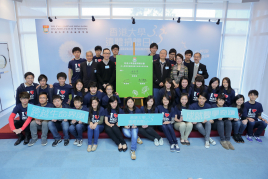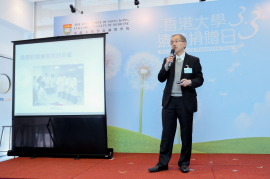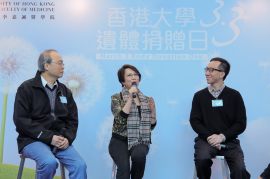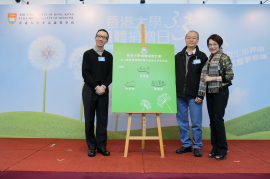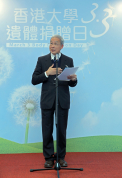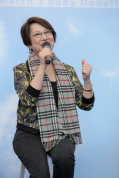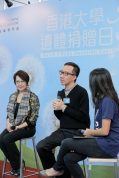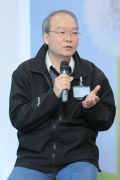Media
3.3 HKU Body Donation Day
Selfless contributions of body donors for the advancement of medicine and
the benefit of patients and their families
03 Mar 2013
The University of Hong Kong Li Ka Shing Faculty of Medicine is designating March 3 2013 as Body Donation Day. Distinguished guests, including Ms Chea Shuk-mui, a media veteran and Professor Gabriel Leung, Head of the Department of Community Medicine, were invited to sign the body donation pledge during the event. The guests, together with dozens of medical students, led the chanting of the slogan: “Crossing the Life Boundaries; Achieving the Medical Miracles” to encourage more people to donate their bodies and become “silent mentors” as a contribution to the advancement of medical education and research.
Professor Lee Sum-ping, Dean of HKU Li Ka Shing Faculty of Medicine, officiated the ceremony. In his speech, he says, “To medical students, the ‘silent mentors’ are of utmost importance. Body dissection provides the opportunity for students to learn anatomy in the best and most realistic way. They can have a real-life experience to touch, feel and sense the tissue, cell, muscle, blood vessels of the human body during dissection. It is just like the process of getting in touch with people. From real human bodies, and not from models or computer-generated graphics, they could be well prepared to treat patients in the future. Each year, before our first-year medical students start dissecting the bodies, we hold a formal and solemn ceremony to pay our respect to all those who have so generously donated. The ceremony also provides an opportunity for the students to reflect on the meaning of life and to develop respect for their patients.”
Professor Gabriel Leung, Head of Department of Community Medicine, HKU Li Ka Shing Faculty of Medicine openly expressed his pledge on body donation for education purpose a few years ago. Professor Leung says, “From my first days as a medical student, I have come to appreciate the wisdom of the human body from my ‘silent mentor’. To this day, when I talk to students, they still marvel at the anatomy of different organs as revealed to them through their own ‘silent mentors’. Having served as a policymaker, I am ever more mindful of the chronic shortage of organ donors and of burial places. So I decided that I would donate all suitable organs when I die, then gift my body to the medical school for anatomy class. This way I could continue my teaching mission as a ‘silent mentor’ beyond the present life.”
Media veteran, Ms Candy Chea Shuk-mui, is also very supportive of body donation. She says, “To me, being able to contribute to the society and put my deceased body to the best use when my life ends is a true blessing. I regret that I did not have the opportunity to attend university. But now I have the opportunity to go to a university as a ‘silent mentor’. When the day comes, I will definitely leave with a smile. I am proud to be a ‘silent mentor’. I hope my humble contribution could help the betterment of medical and health services, and be of benefit to the medical students.” She hopes that body donation in Hong Kong could be as successful as that in Taiwan, and gain wide acceptance from the public.
Students from Medicine, Nursing, Pharmacy, Chinese Medicine and Dentistry, can all benefit from their silent mentors. Dr Chan Lap-ki, Associate Professor of the Department of Anatomy and coordinator of the HKU Body Donation Programme, is also a registered body donor. He says, “Currently, there are about 700 people registered with the HKU Body Donation Programme. Every year, we receive only a few donated bodies as our ‘silent mentors’. The supply is still far below the demand. Body donation is crucial to the training of medical students. We also accept bodies after organ donation.”
Methods for registering as a body donor
Donors can fill out a registration form for the HKU Body Donation Programme and return it to the Medical Faculty. Donors should discuss their decision with their families, especially their next of kin, and get their agreement. When death occurs, their family members will need to inform the Medical Faculty. Donations of bodies will also be accepted from those who did not register but had expressed their wishes during their lifetime, or if their next of kin have made the decision on behalf of the deceased. The donated body may be used soon after arrival at the Medical Faculty or it may be embalmed for medical education and research. Usually in one to two years’ time, the donated body will be cremated and buried through arrangements with the Food and Environmental Hygiene Department. The next of kin of the donor can also choose to collect the cremated remains and arrange for burial or scattering of the ashes by themselves.
About HKU Body Donation Programme
The Department of Anatomy, The University of Hong Kong Li Ka Shing Faculty of Medicine started to accept body donation from the 1970s. In recent years, the demand for human bodies for medical education and research has soared. The Department has thus emphasised and promoted the Body Donation Programme to encourage more people to donate their bodies after they pass away for the purposes of medical education and research.
HKU Body Donation Programme
Inquiries: 2819 9220
Website: http://www.med.hku.hk/bdp/
Please visit the website at http://www.med.hku.hk/v1/news-and-events/press-releases/ for press photos.
The guests, together with more than 30 medical students, led the chanting of the slogan: “Crossing the Life Boundaries; Achieving the Medical Miracles; Support the HKU Body Donation Programme ” in order to encourage more people to donate their bodies and become “silent mentors” as a contribution to the advancement of medical education and research.
Professor Gabriel Leung(Right), Head of Department of Community Medicine, Li Ka Shing Faculty of Medicine, HKU; Ms Candy Chea Shuk-mui (middle ), veteran media professional, and Mr Waily Tang Wai-yin(Left), registered body donor shared their views on body donation.
Professor Lee Sum-ping, Dean of Li Ka Shing Faculty of Medicine, HKU shared his poem which was written for the medical students attending their first dissection class. In the poem, it says “ We are the Dead. Some days ago, like you, We lived, smiled at dawns and Saw sunsets glow. We loved; were loved. And now, for you”
Professor Gabriel Leung, Head of Department of Community Medicine, Li Ka Shing Faculty of Medicine, HKU, says he will donate his organs and body after death to contribute to medical advancement and education.

